How to reduce face to face attrition by up to half
One of the problems of using face-to-face techniques to recruit donors has been the high cancellation rates.
It's not unusual to see more than 50% of all supporters recruited in this way cancel their regular gift in the first year.
The fundraising industry has always struggled with this huge exodus of donors. Much of the blame has been placed with the face-to-face and door-to-door fundraising agencies. The implication has been that they have recruited the 'wrong type' of donor or perhaps put too much pressure on people to sign up.
The agencies responded by offering partial refunds or ever growing numbers of replacement donors.
I've always thought it a crazy situation.
The charity who appoints an agency on these terms doesn't really need to bother investing time and money in engaging donors. After all, the agency is going to cover the costs for for those who cancel.
Yep. It's crazy alright. Of course the agency doesn't pick up the bill. Their prices have to be inflated to cover the cost of offering the guarantee. The charity still pays for the donors who cancel, just as they do for those they retain. And what's more, the donors who slowly drift away after a gift or two aren't covered by any money back or replacement offer.
And this doesn't take into account the impact that a poor experience can have on the perception of a specific charity (or the sector as a whole).
So what do we do about this massive problem?
Something very simple.
We change our attitude.
When launching a street or door recruitment campaign, we shouldn't just cross our fingers and hope for a good crop of new supporters. We should do something positive to demonstrate to our new and usually young donors that we are a charity worthy of their support. We should show them what a rich and rewarding relationship with a charity should actually be like.
As I've pointed out on this blog many times before, one thing that unites all donors is a desire to understand what difference their specific gift has made.
The donors we are recruiting through face-to-face may well be significantly younger than the traditional direct mail donor, but they are no different from their forebears in this key respect. If we can show them what they have done and the resulting impact, there is a very good chance that we'll retain them.
And after a large amount of hard work, we've proved that this theory actually works.
We put this idea into practice last year, when working with DialogueDirect (now Real Fundraising) and Home Fundraising we recruited face-to-face and door-to-door donors for CARE International using an online donor feedback system that we've called USPACE.
We created USPACE as a modular system that any charity or non-profit can use to provide feedback to their donors without the need to go through the expense and time of creating a custom built website. The basic architecture can be re-skinned to fit any design and works with most databases. If anyone saw Matt Goody from Age UK present at the Institute of Fundraising Convention in London, they would have seen an example of how USPACE works.
But for those who couldn't make it along, let me explain. Its starts at the point of recruitment.

Donors are given materials that don't just talk about what the charity has done, but focuses on the work that the donor will be helping make happen. CARE International's new donors, for example, received three seeds – a peanut, a pumpkin seed and a grain of rice. Each signified a specific project. Accompanying the seeds was a small sheet of stickers that the donor could use to send messages to some of the children who will benefit from their support.
The donor was also pointed to USPACE in the guise of www.mycarezone.orgto find out what their gift was making possible.
The site has been built to place the donor at the centre of CARE International's work. Even their name is given the same prominence as the charity logo. The language is inclusive. It talks about what the donor has done. You is heavily used instead of the ubiquitous We found on so many charity sites.
Through regular updates, the donor gets to see a project unfold, often from different points of view – a beneficiary, a project worker or even another supporter.
The site doesn't pretend to be a Facebook type social networking site. It's far from it. But what it does do is build on the decision making process described by Mark Earls author of Herd…
"The assumption is that by-and-large, individuals make decisions on their own. My Herd point-of-view is that people influence each other, often without realising it."
Donors are encouraged to share why they are supporting CARE International and what they like about the projects they read about. Each time someone visits the site they get to see that they are actually part of a community. But most importantly, they see the reason why other people are giving. These endorsements help to create a virtuous circle where donors are reinforcing each others giving.
We've also turned the concept of project information on its head. Rather than just the charity deciding what work should be shared, donors can flag up what they are interested in. And we also use information from outside the organisation. Relevant films on YouTube, articles from newspaper and magazine sites and great photographs (like these from Bangladesh) can all be used at no cost through linking and embedding. You can see another sample page by clicking here.
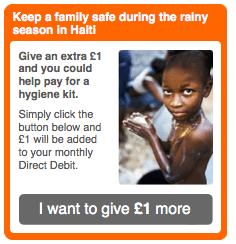 You'll also see from the main page that upgrading and adding extra gifts is incredibly easy. By clicking the button I've highlighted on the right, a gift is added to the next direct debit payment. Donors seem to love it.
You'll also see from the main page that upgrading and adding extra gifts is incredibly easy. By clicking the button I've highlighted on the right, a gift is added to the next direct debit payment. Donors seem to love it.
Should a donor cancel their gift, the site can help identify the reason and offer them a chance to reduce their gift or even take a small payment holiday.
USPACE has many similar features that engage and empower donors (too many to cover in one blog post), but I imagine you are wondering about the impact?
As you'll see from the results graph, it halved attrition over the first 4 months amongst the people who signed up (those with 0 payments are people who cancelled their direct debit before their first gift).
I can't share precise figures, but compared to 2009, attrition was down even amongst new recruits who hadn't signed up to USPACE (No MCZ). What's most exciting however, is that we have seen a massive 50% fall in cancellations from those supporters who did sign up (MCZ).
Our next goal is to offer USPACE to more donors and we are currently trialing initiatives to ensure more donors take advantage of the great feedback on offer.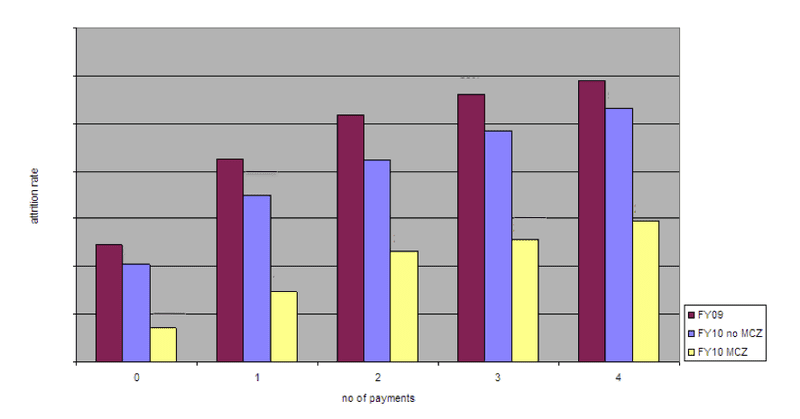 Adrian Sargeant pointed out in Building Donor Loyalty, that attrition is an expensive activity. By reducing an attrition rate from 20% to 10% an organisation can increase it's revenue by 50% over ten years.
Adrian Sargeant pointed out in Building Donor Loyalty, that attrition is an expensive activity. By reducing an attrition rate from 20% to 10% an organisation can increase it's revenue by 50% over ten years.
I'll leave the last word on USPACE to CARE International's Head of Direct Marketing, Tracey Horner...
"Engagement is up and attrition is down. We are now offering USPACE to all supporters and plan to expand its use to reactivation of lapsed donors. If the effect is anywhere near that achieved for face-to-face, we are going to be as happy as our supporters appear to be with their enhanced understanding of what their gift actually achieves.
Their feedback shows they really appreciate seeing how they actually make a difference."
Tags In
Related Posts
8 Comments
Comments are closed.
The Essentials

Crack the Code to Regular Giving: Insights, Strategies, and a Special Giveaway!

‘Tis Halloween. Keep to the light and beware the Four Fundraisers of the Apocalypse!

Why do people give? The Donor Participation Project with Louis Diez.

A guide to fundraising on the back of a postcard

What does the latest research tell us about the state of fundraising?


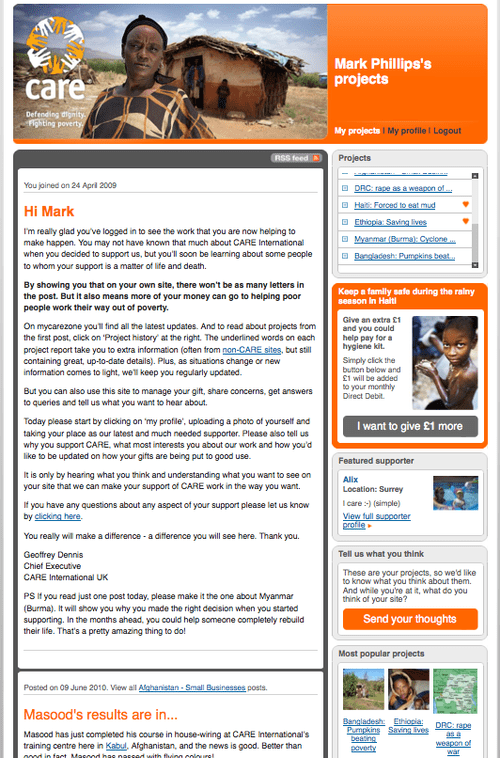
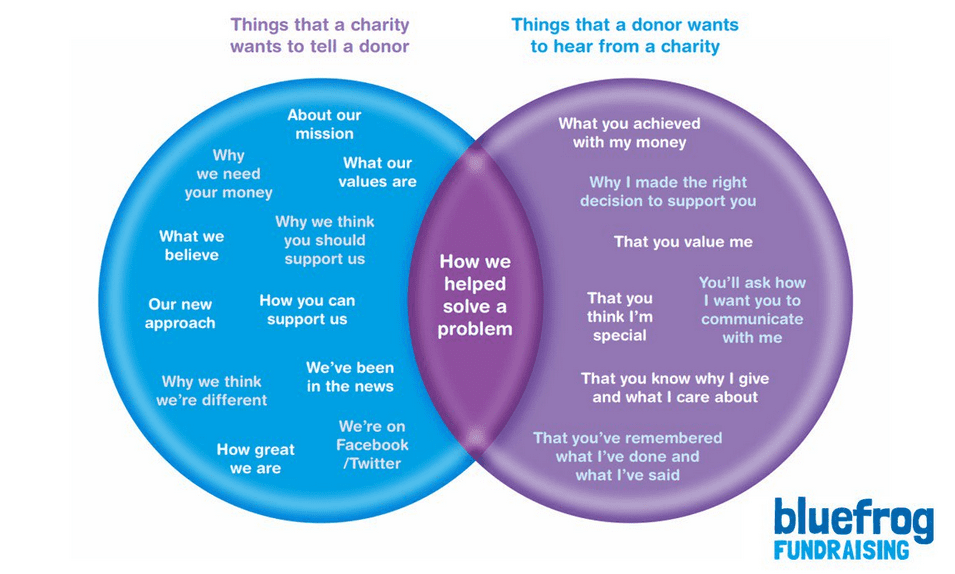
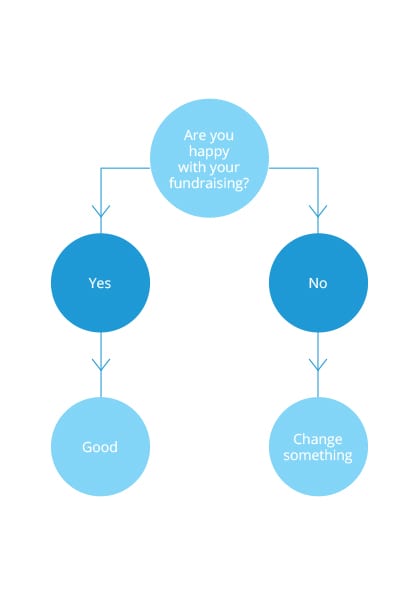
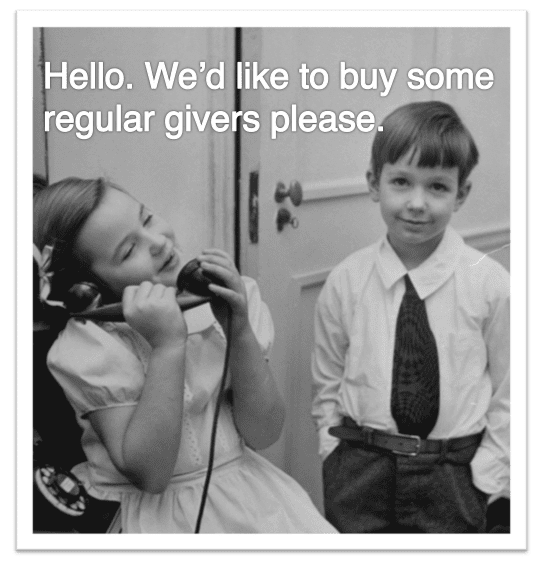




A great example of digital engagement with new regular givers ,with results; congratulations.
Hi Donald
I’m glad you like it and really appreciate your kind words. It’s the result of a great deal of hard work and a little recognition really makes it worthwhile.
Best wishes
Mark
Results seem self fulfilling. The cohort of donors signing onto USPACE will be those with a strong affinity and would have a low attrition anyway. Am I missing something?
Hi Yaelwass
If you combine both cohorts – those who signed up and those that didn’t – overall attrition is significantly down compared to the previous year.
Face to face donors tend to lapse at well over 50% and in research we see satisfaction and engagement levels from those remaining is often very low.
Of course, some of those donors who move to USPACE may have an affinity with CARE (or most likely, development issues). But what is most exciting is that we are building affinity where it simply didn’t exist before – amongst donors who have been attracted by the knowledge that they are going to see how their gifts have been used.
I probably failed to make clear that this offer was central to the recruitment process and can not be discounted as influencing the very low attrition rate we have seen.
CARE promised feedback and have delivered. It’s a very powerful brand experience.
However you look at it, donors were attracted by the offer of online feedback and the result has been much lower attrition across the board.
Thanks for reading.
I would like to learn more about USPACE but google keeps pointing me to sites that I don’t think are the same as what you are talking about. Can you direct me?
Hi Kim
Unfortunately this post is the only information that we currently have available on USPACE. But in response to the interest it’s generated, we are currently putting together a more detailed product description. I’ll announce on the blog as soon as it is available.
Thanks for reading.
Mark
Hi Mark,
I have read with interest this blog and am looking at implementing something similar at the charity I work with.You mentioned back in July that you were putting together a more detailed product description – are you any further with this and where could I get more information?
Look forward to your reply
Sam
Yes I’d love to see more about this as soon as it is available. I work with a number of charities that would benefit from it.
Jill